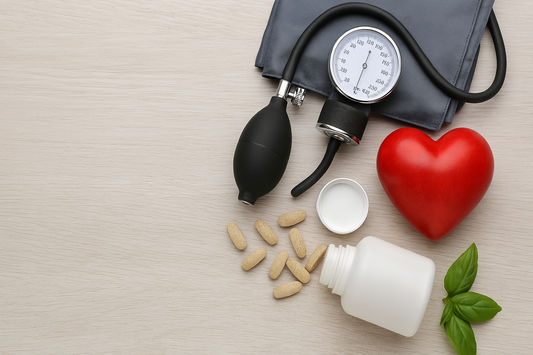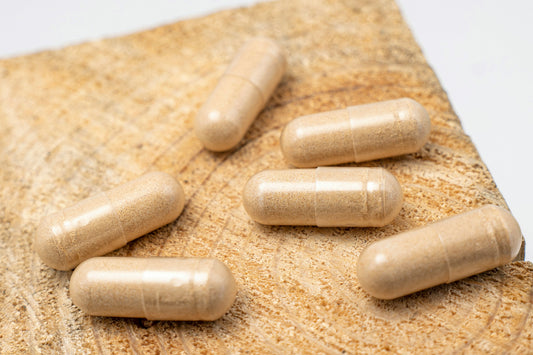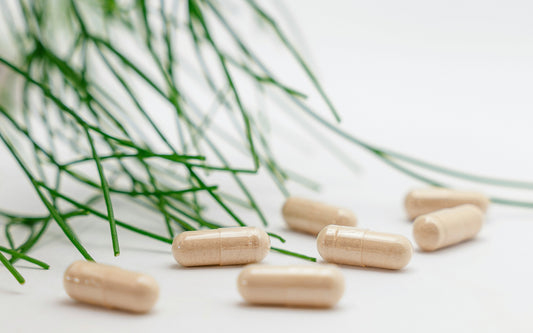Natural Guide for Effective Blood Pressure Support
Welcome to our comprehensive guide on natural ways to support healthy blood pressure levels. High blood pressure is a common health concern that affects millions of people worldwide. Fortunately, there are natural remedies and lifestyle changes you can make to help maintain optimal blood pressure. In this guide, we will explore diet tips, lifestyle changes, and natural remedies that can help you achieve overall blood pressure support.
Key Takeaways
- High blood pressure is a common health concern.
- Natural remedies and lifestyle changes can help maintain optimal blood pressure levels.
- Dietary changes, natural remedies, and regular monitoring can support overall blood pressure health.
- Exercise, stress management, and quitting smoking can also contribute to blood pressure support.
- By implementing these natural ways to support blood pressure, you can take control of your health and lead a life with optimal blood pressure levels.
Understanding Blood Pressure
Before we delve into natural ways to support blood pressure, it's essential to understand what blood pressure is and how it affects your overall health. Blood pressure is the force of blood pushing against the walls of your arteries. It's measured in millimeters of mercury (mmHg) and recorded in two numbers, systolic and diastolic. Systolic pressure measures the pressure in your arteries when your heart beats, and diastolic pressure measures the pressure in your arteries when your heart rests between beats.
It's important to know your blood pressure levels because high blood pressure, or hypertension, can lead to serious health problems such as heart attack, stroke, and kidney disease. A healthy blood pressure level is typically around 120/80 mmHg.
Understanding Blood Pressure Levels
According to the American Heart Association, the following blood pressure categories are used to determine your level of risk for health problems:
|
Blood Pressure Category |
Systolic Pressure (mmHg) |
Diastolic Pressure (mmHg) |
|
Normal |
Less than 120 |
Less than 80 |
|
Elevated |
120-129 |
Less than 80 |
|
Stage 1 Hypertension |
130-139 |
80-89 |
|
Stage 2 Hypertension |
140 or higher |
90 or higher |
|
Hypertensive Crisis (seek emergency care) |
Higher than 180 |
Higher than 120 |
If your blood pressure falls within the elevated or hypertensive categories, it's essential to take steps to lower it and improve your overall health.
The Role of Diet in Blood Pressure Support

One of the most effective ways to support healthy blood pressure levels is by adopting a healthy diet. Specific foods can help lower blood pressure, while others can contribute to high blood pressure. Here are some diet tips:
- Include plenty of potassium-rich foods like bananas, sweet potatoes, and avocado.
- Reduce your sodium intake by avoiding processed foods, canned foods, and condiments.
- Increase your intake of heart-healthy fats like omega-3 fatty acids found in fatty fish, nuts, and seeds.
- Eat a variety of fruits, vegetables, and whole grains for their rich nutrient profiles.
In addition to dietary changes, taking a high-quality blood pressure support supplement can also provide additional benefits. Talk to your healthcare provider about what the best supplement for high blood pressure may be for your individual needs.
Lifestyle Changes for Blood Pressure Support
Making simple lifestyle changes can have a significant impact on your blood pressure and overall health. Implementing these changes can reduce the risk of developing high blood pressure and support healthy blood pressure levels.
Eat a Balanced Diet
Your diet plays a vital role in controlling your blood pressure. Consuming a diet rich in fruits, vegetables, whole grains, and lean proteins can help in blood pressure control. Additionally, it's essential to limit high-sodium foods and processed foods, which can contribute to high blood pressure.
Engage in Physical Activity
A sedentary lifestyle can lead to high blood pressure. Regular physical activity can help you maintain healthy blood pressure levels. Engage in at least 30 minutes of moderate-intensity exercise per day, such as brisk walking or cycling. You can also engage in strength training to help lower your blood pressure.
Manage Stress
Stress can contribute to high blood pressure. It's essential to manage your stress levels through activities such as meditation, yoga, and deep breathing exercises. Additionally, practicing mindfulness can help you reduce stress and support healthy blood pressure levels.
Avoid Smoking and Limit Alcohol Intake
Smoking can increase blood pressure levels. Quitting smoking can have a significant impact on your blood pressure. Additionally, limiting alcohol intake can help maintain healthy blood pressure levels.
By making these lifestyle changes, you can support healthy blood pressure levels and reduce the risk of developing high blood pressure.
Natural Remedies for Blood Pressure Support
Many natural remedies have been found to be effective in supporting healthy blood pressure levels. It's essential to note that natural remedies should only be used as a complement to a healthy lifestyle and under the guidance of a healthcare provider.
What Herbal Supplement Lowers Blood Pressure?
One of the most popular herbal supplements for blood pressure support is NutriGrove Blood Pressure Support. Studies have shown the 8 herbs found in it’s all natural blend help lower blood pressure. Let us take a look below on how each of the eight herbs play a roll in lowering blood pressure
Eight Natural Remedies for Blood Pressure Support
Natural remedies that have been found to be effective in supporting healthy blood pressure. These include:
- Garlic: Garlic contains allicin, a compound that has been shown to help relax blood vessels. Reduces levels of total cholesterol and low-density lipoprotein (LDL) cholesterol, often referred to as "bad" cholesterol.
- Hibiscus Flower: Hibiscus contains compounds that can help lower blood pressure by relaxing the arteries. The flower is rich in antioxidants that may help protect the heart from damage caused by free radicals.
- Uva Ursi Leaf: Uva ursi leaf has diuretic effects, which can aid in reducing fluid retention and blood pressure levels.
- Buchu Leaf: Similar to Uva Ursi, buchu leaf is known for its diuretic effects, aiding in the elimination of excess fluids.
- Juniper Berry: Juniper berries act as a diuretic, helping to remove excess sodium and water from the body, which can help regulate blood pressure.
- Olive Leaf: Olive leaf extract has been associated with reductions in both systolic and diastolic blood pressure.
- Hawthorn Berry: Hawthorn berries enhance blood flow by dilating blood vessels, which can be beneficial for increased blood flow.
- Green Tea Leaf: Green Tea contains catechins which have been shown to lower levels of LDL cholesterol and triglycerides.
It's important to note that before taking any natural remedies, it's essential to speak with your healthcare provider to ensure they are safe for you to use.
The Importance of Monitoring Blood Pressure
Regular monitoring of your blood pressure is crucial in maintaining healthy blood pressure levels. It is essential to keep track of your numbers and understand how lifestyle changes and natural remedies are impacting your health.
There are different methods available to monitor your blood pressure, including:
- Home blood pressure monitors
- Automatic blood pressure machines in pharmacies and clinics
- Manual blood pressure readings taken by a healthcare provider
It's also essential to understand what your blood pressure numbers mean. Blood pressure readings consist of two numbers: systolic and diastolic. Systolic pressure is the top number, and diastolic pressure is the bottom number. A normal blood pressure reading is less than 120/80 mmHg.
Monitoring your blood pressure is especially important if you have been diagnosed with high blood pressure or are at risk of developing it. It is recommended that individuals with high blood pressure monitor their blood pressure at home and keep track of their readings regularly.
Overall, tracking your blood pressure can help you make informed decisions about your health and understand the effectiveness of your blood pressure support efforts. Make sure to consult with your healthcare provider about the best methods for monitoring your blood pressure and what your target blood pressure range should be.
Incorporating Exercise for Blood Pressure Support

Regular exercise is an essential component of supporting healthy blood pressure. Physical activity helps strengthen the heart and lower blood pressure by reducing the amount of work it needs to do to pump blood. Aim to exercise for at least 30 minutes a day, five days a week.
Cardiovascular exercises: Aerobic exercises such as brisk walking, jogging, cycling, or swimming are excellent choices for lowering blood pressure. These activities raise your heart rate and improve blood flow.
Strength training: Resistance training such as weightlifting and bodyweight exercises can also be beneficial for blood pressure support. These exercises help build muscle, which requires less oxygen than fat tissue and reduces the workload of the heart.
|
Exercise Tips |
|
Start slow: If you're new to exercise, start slowly and gradually increase the intensity and duration of your workouts. |
|
Choose activities you enjoy: Incorporate physical activities that you enjoy such as dancing, hiking, or playing sports to make exercise more fun and sustainable. |
|
Stay consistent: Consistency is key to reaping the benefits of exercise. Find a routine that works for you and stick to it. |
Remember, exercise is just one piece of the puzzle when it comes to blood pressure support. Incorporating a healthy diet, making lifestyle changes, and monitoring your blood pressure are also essential steps in achieving optimal blood pressure levels.
Managing Stress for Blood Pressure Support
Stress is a significant contributor to high blood pressure. Chronic stress can lead to the constriction of blood vessels, which can result in increased blood pressure. That’s why managing stress is vital to controlling your blood pressure levels. Here are some stress management techniques that you can incorporate into your daily routine:
- Exercise: Physical activity is not only effective in supporting healthy blood pressure levels but is also an excellent way to combat stress. Regular exercise has been shown to reduce stress hormones like cortisol and release endorphins, which can improve mood and reduce stress. Try incorporating 30 minutes of moderate exercise into your daily routine.
- Meditation: Meditation is a technique that involves focusing your attention on a particular object or thought to achieve a mentally clear and emotionally calm state. Research has shown that meditation can help reduce stress, anxiety, and blood pressure. Consider practicing mindfulness meditation for 10-15 minutes daily.
- Deep breathing exercises: Breathing exercises can be a useful tool in reducing stress and supporting healthy blood pressure levels. Deep breathing exercises can help slow down your heart rate and reduce tension in your muscles. Try practicing deep breathing exercises for 5-10 minutes each day.
By incorporating stress management techniques like these into your daily routine, you can help support healthy blood pressure levels and improve your overall well-being.
Quit Smoking for Blood Pressure Support

Smoking is a major risk factor when it comes to high blood pressure. Nicotine in cigarettes is a potent vasoconstrictor, which means it can narrow blood vessels and increase blood pressure levels. It is also a key contributor to the development of heart disease and stroke.
If you smoke, quitting is one of the most effective ways to support healthy blood pressure levels. It's not an easy process, but it is worth it. Within just a few weeks of quitting, your blood pressure can begin to drop, reducing your risk of heart disease and stroke.
There are many strategies to help you quit smoking, from nicotine replacement therapy to counseling and support groups. The most important thing is to find a method that works for you and stick with it.
Remember that quitting smoking is not only beneficial for your blood pressure but for your overall health as well. It can help you breathe easier, improve your circulation, and reduce your risk of cancer and other diseases.
Take the first step in supporting your blood pressure by quitting smoking today. Your body will thank you.
Conclusion
By implementing natural ways to support blood pressure, you can take control of your health and lead a life with optimal blood pressure levels. Maintaining a healthy diet, making lifestyle changes, incorporating natural remedies, and monitoring your blood pressure are essential steps in achieving overall blood pressure support.
Remember, understanding your blood pressure and the different levels is crucial for your well-being. Your diet plays a significant role in supporting healthy blood pressure, so it's important to include the right foods and reduce sodium intake. Additionally, certain supplements have been shown to help with blood pressure support.
Simple lifestyle changes can go a long way in supporting your blood pressure, such as incorporating physical activity, managing stress, and quitting smoking. These changes can contribute to your overall health and well-being.
Don't forget to regularly monitor your blood pressure levels to understand how your lifestyle changes and natural remedies are impacting your health. Blood pressure monitoring can be done in a variety of ways, and it's essential to keep track of your numbers to ensure you are on track with your blood pressure support.
Incorporating Natural Blood Pressure Support
To effectively support blood pressure, it's important to consider incorporating natural ways to manage your blood pressure. Explore herbal supplements and natural remedies that have been shown to help support healthy blood pressure levels. In addition, exercise, stress management, and quitting smoking are all essential ways to support your blood pressure naturally.
By taking these steps, you can ensure that you are taking control of your blood pressure and leading a healthy, happy life. Remember to always consult with your healthcare provider before making any significant changes to your diet or lifestyle.
FAQ
What is the best supplement for high blood pressure?
The best supplement for high blood pressure depends on individual needs and health conditions. Consult with a healthcare professional to determine which supplement may be most suitable for you.
What herbal supplement lowers blood pressure?
Several herbal supplements have been found to help lower blood pressure, including hawthorn, garlic, and olive leaf extract. However, it is crucial to consult with a healthcare professional before incorporating herbal supplements into your routine.
What is the number one herb for high blood pressure?
While there is no single "number one" herb for high blood pressure, some commonly recommended herbs include hibiscus, garlic, and turmeric. These herbs have been shown to have potential blood pressure-lowering effects, but it is important to discuss their use with a healthcare professional.
What are the different blood pressure levels?
There are different blood pressure levels, including normal, elevated, stage 1 hypertension, and stage 2 hypertension. Normal blood pressure is typically defined as systolic pressure below 120 mmHg and diastolic pressure below 80 mmHg. Elevated blood pressure ranges from 120-129 mmHg systolic and less than 80 mmHg diastolic. Stage 1 hypertension is between 130-139 mmHg systolic or 80-89 mmHg diastolic, while stage 2 hypertension is 140 mmHg or higher systolic or 90 mmHg or higher diastolic.
What foods can support healthy blood pressure?
Foods that can support healthy blood pressure include fruits, vegetables, whole grains, low-fat dairy products, lean proteins, and foods rich in potassium, magnesium, and fiber. It is important to maintain a balanced diet and limit sodium intake to promote optimal blood pressure levels.
How can I reduce sodium intake?
To reduce sodium intake, try cooking meals at home using fresh ingredients and seasonings instead of relying on processed foods. Read nutrition labels carefully and choose low-sodium options whenever possible. Avoid adding table salt to your meals and increase the consumption of potassium-rich foods, as they can help counterbalance the effects of sodium.
What are effective lifestyle changes for blood pressure support?
Effective lifestyle changes for blood pressure support include regular exercise, stress management techniques, quitting smoking, maintaining a healthy weight, and limiting alcohol consumption. These changes can have a positive impact on blood pressure levels and overall health.
How can exercise help support healthy blood pressure?
Regular physical activity can help support healthy blood pressure by improving cardiovascular health, reducing stress, and aiding in weight management. Aim for at least 150 minutes of moderate-intensity aerobic exercise per week, or 75 minutes of vigorous-intensity exercise, along with muscle-strengthening activities twice a week.
What are effective stress management techniques for blood pressure support?
Effective stress management techniques for blood pressure support include meditation, deep breathing exercises, yoga, mindfulness, engaging in hobbies or activities that bring joy, and seeking social support. Finding healthy ways to cope with stress can help reduce blood pressure levels and promote overall well-being.
How does smoking affect blood pressure?
Smoking is a significant risk factor for high blood pressure. It can cause blood vessels to narrow, increase heart rate, and damage the lining of arteries. Quitting smoking is essential for blood pressure support and overall cardiovascular health.
Why is monitoring blood pressure important?
Regularly monitoring your blood pressure is important to understand how lifestyle changes, natural remedies, and medications impact your levels. It provides valuable information to healthcare professionals and helps you stay proactive in maintaining optimal blood pressure.
How can I monitor my blood pressure?
There are different methods to monitor blood pressure, including using a home blood pressure monitor, visiting a healthcare professional for regular check-ups, or utilizing blood pressure kiosks available in some locations. It is advisable to follow the instructions provided with your chosen method and consult with a healthcare professional if you have any concerns.
What is the importance of overall blood pressure support?
Overall blood pressure support is crucial for maintaining good health and reducing the risk of cardiovascular diseases. By implementing natural ways such as diet, lifestyle changes, and natural remedies, you can take control of your blood pressure and live a healthier life.






